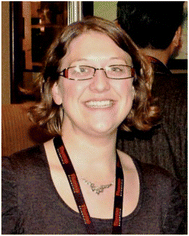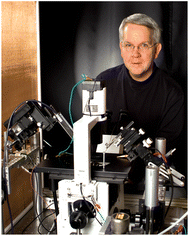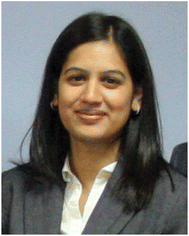Analyst, unconfined by traditional discipline barriers
Welcome to issue 1, 2012 of Analyst and may we wish you a very happy New Year from all the journal team! 2011 has proven to be another significant year in the development of Analyst and growth has definitely been the theme. We have continued to achieve our aim of publishing more of the highest quality analytical and bioanalytical science, with over 700 articles published in 2011. Looking back over the past five years (Fig. 1), this is greater than a staggering 300% growth over this period!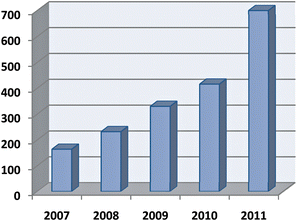 | ||
| Fig. 1 Analyst growth in published articles over the past 5 years. | ||
To complement our growth in content, we have also seen the quality grow too. We are delighted to say that we have also seen a significant rise in our Impact Factor to 3.91 (2010 JCR®, Thomson Reuters), underlining our aim of publishing premier analytical research.
To accompany our rapid development, we have also chosen to redefine how Analyst is described, in particular to emphasize the quality of articles published in the journal, and the broad appeal that Analyst offers across scientific disciplines. In future, you will see the journal scope described as:
| Analyst publishes analytical and bioanalytical research that reports on premier fundamental discoveries and the application of those discoveries, unconfined by traditional discipline barriers |
The journal also continues to grow in international profile and presence, with authors coming from all over the world. Our international appeal is confirmed by authors from over 50 different countries choosing to submit to Analyst in 2011!
To truly represent our international authorship, and to provide our authors with the choice of how the peer-review of their article is handled, we have recently appointed two new Associate Editors.
Takehiko Kitamori from the University of Tokyo will be handling articles from Japan and South-east Asia. His appointment is in recognition of the high-quality analytical science being conducted in Japan and to provide an alternative choice for our authors in Asia. Alongside this, the Royal Society of Chemistry is also very happy to also announce the official opening of our office in Tokyo, Japan. This is accompanied by the appointment of Hirofumi Seike as RSC Representative in Japan, and he is looking forward to working with Analyst readers, authors and referees in Japan on non-editorial matters in the future.
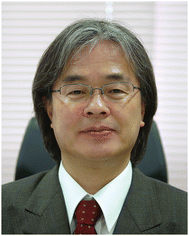 | ||
| Plate1 Takehiko Kitamori, Associate Editor for Asia in Japan | ||
To build on our representation in the Americas, Evan Williams from the University of California, Berkeley, joins Steve Soper as our two Associate Editors for the Americas. Evan's expertise will complement our existing Editorial Board and we look forward to working with him in the coming years.
 | ||
| Plate2 Evan Williams, Associate Editor for the Americas | ||
The Associate Editors for Analyst will continue to work alongside the Cambridge Editorial office, offering choice for authors for where they would like to submit their research. The Associate Editors and the Cambridge office look forward to receiving your next article in 2012.
We would like to warmly welcome several new Advisory Board members to the Analyst journal team (Fig. 2): Yoon-Kyoung Cho from Ulsan National Institute of Science and Technology, Korea; Qun Fang from Zhejiang University, China; Lingjun Li from University of Wisconsin-Madison, USA; and Frank Sobott from University of Antwerp, Belgium.
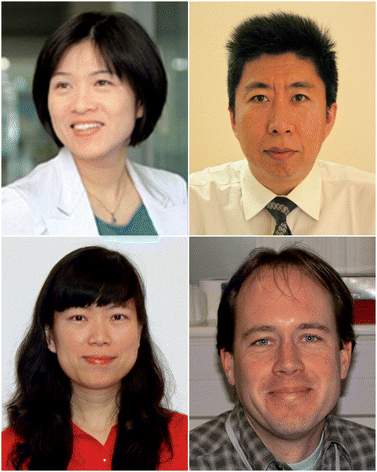 | ||
| Fig. 2 New Analyst Advisory Board members: (top) Yoon-Kyoung Cho, Ulsan National Institute of Science and Technology, Korea; Qun Fang, Zhejiang University, China; (bottom) Lingjun Li, University of Wisconsin-Madison, USA; Frank Sobott from University of Antwerp, Belgium. | ||
We also would like to thank our existing Associate Editors, Editorial and Advisory Board members for their much appreciated input and support this past year, and look forward to working with them again in 2012.
2011 was proclaimed as the IUPAC International Year of Chemistry, with the aim of increasing the public appreciation of chemistry in meeting world needs, to encourage interest in chemistry among young people and to generate enthusiasm for the creative future of chemistry. There were numerous events at the RSC to mark this, including taking part in the Global Chemistry Experiment! Here at Analyst, we also chose to examine the ways in which analytical chemistry can play a role in tackling some of our global challenges. We published a selection of ‘Grand Challenges’ articles which cover a range of topics including the role of protein–DNA interaction in genome regulation,1 extended nanospace chemical systems on a chip for new analytical technology2 and grand challenges in high throughput detection, countrywide sampling, and forensics in developing countries,3 to name a few. There are still more articles to come in this series, so why not take a look at the ongoing selection of Grand Challenges articles published in Analyst: www.rsc.org/analyst/grandchallenges.
At Analyst we also have a tradition of recognising the very best up-and-coming researchers, and in 2011 we published our next in the series of Emerging Investigators themed issues. This issue was guest edited by Advisory Board member Christy Haynes, from University of Minnesota, USA and Perdita Barran, University of Edinburgh, UK. The result is a fantastic collection of original ideas from new investigators, which promises much for the future of analytical science.4 Read more of the articles in the issue: www.rsc.org/analyst/emerginginvestigators.
So what does the future hold for Analyst in 2012? We are happy to say that we will be offering Analyst authors our Accepted Manuscript service, meaning that your research will be available online, in citable form, even more rapidly. An Accepted Manuscript is an unedited and unformatted version of an article that is published shortly after acceptance. It is available as a downloadable pdf file. It is then replaced by the fully edited and formatted Advance Article. Find out more about this service on the dedicated page on our website, www.rsc.org/acceptedmanuscripts.
We have a selection of themed issues planned for 2012, including our ‘Single’ issue. This themed issue is dedicated to the study of single components of ensembles. The focus of the issue is on the relationship between studies that target single units (molecules, cells, organelles, pores etc.) and the special behaviour that characterizes outliers in the distribution.
We will be continuing to develop our joint web theme on ‘Future Electroanalytical Developments’ with sister journal Analytical Methods. This collection of articles is already up and running, so please do have a look at the exciting research already published, and we invite you to consider submitting to this web theme in 2012, www.rsc.org/analyst/electroanalytical.
Analyst editors will also continue to work together with Analytical Methods to provide authors with the best possible home for their analytical research. For further details on how the journals fit together, read the Editorial from Analyst Chair, Paul Bohn and Analytical Methods Editor-in-Chief, Brett Paull.5
We also invite you to follow the latest developments on the Analyst blog, find out about our most-read and Hot Articles, themed issue news, conference updates and we welcome any comments from you as authors and readers on any of the above topics. Watch out also for more information about our cover articles, which are free to access for a month from issue publication! http://blogs.rsc.org/an
More of the latest news and future developments from RSC Publishing can also be found below.
RSC Publishing growth and successes
Journals from RSC Publishing are delivering impressive results on Impact Factors, growth in quality content and international visibility and influence. The 2010 Journal Citation Reports® proved that our quality is better than ever, and that is thanks to our authors and referees. Of the top 20 journals in the multi-disciplinary chemistry category, 25% are from RSC Publishing. Plus 83% of our journals listed in this year's report have an IF above 3.The number of articles published in our journals has almost doubled in just two years – and our share of the total has also nearly doubled in that time. More titles have recently joined our portfolio: RSC Advances and Catalysis Science & Technology. And Chemical Science received the ALPSP Award for Best New Journal 2011.
So more and more authors – from 70+ countries in 2011 – are trusting us to ensure that their research is communicated to the global community. Our Editorial and Advisory Boards are international, and our publishing operation is supported by offices in USA, China, India and Japan. Plus our content is downloaded by growing numbers of readers in virtually every country in the world.
These facts demonstrate that RSC journals are increasingly valued as a key resource for the very best research. www.rsc.org/journals
Books delivering the latest research advances, information, opinions and perspectives in modern science, confirms our reputation as one of the fastest and most dynamic publishers in the world.
In an age where content is key, we understand the importance of your online chemical science resource. The RSC eBook Collection now holds more than 1000 books, equating to over 25![[thin space (1/6-em)]](https://www.rsc.org/images/entities/char_2009.gif) 000 chapters, and spanning more than 40 years. The publication of our 1000th eBook in 2011 was a celebratory milestone.
000 chapters, and spanning more than 40 years. The publication of our 1000th eBook in 2011 was a celebratory milestone.
We continue to provide expert, interdisciplinary chemical science books: over 100 new print titles are planned for 2012 alongside the launch of several new series including:
• Food and Nutritional Components in Focus
• New Developments in Mass Spectrometry
• New Developments in NMR
• RSC Smart Materials
Our ability to deliver fast, accurate information to our customers was rewarded by the BIC Basic Award, an accolade held by few publishers. www.rsc.org/books
RSC Publishing Platform
Access one million journal articles and book chapters in one simple integrated search.The RSC Publishing Platform provides the most valued interface and features that connect you with the highest quality scientific research. With one single search box, students, academics, researchers, scientists and professionals can easily access our books, journals and databases. www.rsc.org/platform
To access content on the go, download our RSC Mobile app for your electronic device. www.rsc.org/rscmobile
Free online access
Free online access is available to all our newest journals, and much more – all you need to do is register for an RSC Publishing Personal Account. Once logged in, you will be able to access all our free content including:• All content of our newest journals for the first two volumes
• Any articles that are part of a special free access promotion (e.g. ‘hot’ papers, web theme issues, etc.)
• A sample chapter from each book in the RSC eBook Collection
With your username and password you can access free content any time, any place – all you need is internet access. You can also save searches and favourite articles. Register now at www.rsc.org/personalregistration.
If your institution/organisation is a current customer or on a free trial with IP registered addresses, you will be able to access all free content automatically, if authenticated. To request free access for your institution/organisation, go to www.rsc.org/freeaccess.
ChemSpider: the free chemical database
www.chemspider.com gives you the most comprehensive view of freely available chemical data from a single online search.Search: over 26 million structures from 400+ sources
Discover: related information from RSC publications, Wikipedia, Google Scholar & PubMed
Share: add and curate data
Access ChemSpider any time, any place, anywhere with the free ChemSpider mobile app, www.rsc.org/ChemSpidermobile.
RSC conferences and events 2012
The RSC organises a broad range of conferences and events to promote the advancement of the chemical sciences. Please visit the website for the most up to date listing: www.rsc.org/eventsThe major scientific meetings planned for 2012 include:
Analytical Research Forum 2012
2–4 July 2012, Durham, UK. www.rsc.org/ARF12Challenges in Nanoscience (ISACS9)
31 August–3 September 2012, Xiamen, China. www.rsc.org/isacs9 Finally, we hope that you enjoy reading Analyst this coming year, and look forward to working with you throughout 2012!May Copsey, Editor, Analyst
Paul Bohn, Chair of Analyst Editorial Board
Vibhuti Patel, Deputy Editor, Analyst
References
- L. M. Smith, M. R. Shortreed and M. Olivier, Analyst, 2011, 136, 3060–3065 RSC.
- K. Mawatari, T. Tsukahara and T. Kitamori, Analyst, 2011, 136, 3051–3059 RSC.
- F. M. Fernandez, D. Hostetler, K. Powell, H. Kaur, M. D. Green, D. C. Mildenhall and P. N. Newton, Analyst, 2011, 136, 3073–3082 RSC.
- C. Haynes and P. Barran, Analyst, 2011, 136, 3405–3405 RSC.
- P. Bohn and B. Paull, Analyst, 2011, 136, 429–430 RSC.
| This journal is © The Royal Society of Chemistry 2012 |

